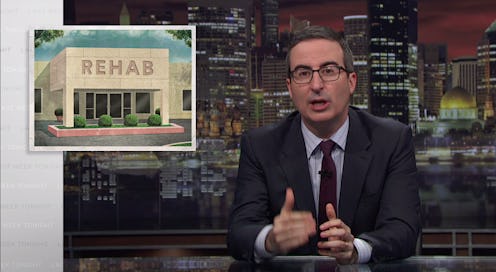News
John Oliver's Latest Segment On Unregulated Rehab Centers Is Straight-Up Startling

On the most recent episode of Last Week Tonight, John Oliver railed against rehab centers, condemning the lack of industry regulation and chastising many of them for the promises they supposedly fail to keep. How these facilities operate is something you may have never considered up until this point, and clearly, Oliver wants to change that.
As Oliver described, in recent years there has been significant progress regarding how addiction is perceived in the United States. Addiction is taken more seriously and usually perceived as a medical issue, with many insurers now paying for rehabilitation treatment. While Oliver acknowledged that these constitute great strides in terms of helping people recover from addiction, he also pointed out that there are unfortunately many shortcomings still associated with the rehab industry.
As the late night host described, the rehab industry is, frankly, massive — and massively profitable. The host cited a New York Times article revealing that the addiction treatment industry brings in $35 million per year. He also noted that there are over 14,000 rehab facilities in the United States.
However, despite the pervasiveness of rehab centers in the country, Oliver pointed out that, interestingly, there is actually "no set definition for what it [a rehab center] should consist of ... In fact, there are no federal standards for counseling practices or rehab programs." Moreover, while acknowledging that many rehab centers are earnestly trying to help patients, Oliver also revealed an alarming fact about the care that many people receive at some of these centers. The host noted that a recent report found that "the vast majority of people in need of addiction treatment do not receive anything that approximates evidence-based care."
For example, Oliver highlighted how rehab centers can "frame almost anything as treatment" by discussing equine therapy, which focuses on using interactions between patients and horses to help combat addiction. As Oliver noted, "if people respond to that that's great, but there is no empirical evidence that, as a treatment for addiction, it [equine therapy] works." Thus, the host emphasized that people can end up paying significant amounts of money for treatments that sometimes do little, if anything, to curb their addictions.
Later on in his segment, Oliver also stressed how rehab centers often use insurance payouts to make profits. For example, Oliver noted that, in Florida, some rehab centers have capitalized on the fact that insurance companies will pay for urine tests. Indeed, as the host pointed out, some centers have "arranged for kickbacks from testing facilities, basically meaning that the more urine they take, the more money they make."
Oliver then played a clip from Hunting for Addicts on his show revealing that, for $30 store-bought urine test, you can get up to $1,500 in payouts from insurance companies ... if you run five tests a week on a single addict, that's $7,500." These profits are, of course, multiplied when you factor in multiple patients. Indeed, Oliver noted that urine is considered so valuable in the drug rehab industry that it is sometimes referred to as "liquid gold."
Moreover, Oliver also noted that some rehab centers have become so focused on making money from patients via insurance payouts that they engage in practices known as "patient brokering" or "junkie hunting." The host then played a clip that described how those who operate sober living facilities often compete to try to attract patients with good insurance policies so they will receive higher payouts. Oliver also pointed out that it is often more profitable for people to relapse and be re-admitted to rehab centers than it is for them to recover. So, Oliver asserted, "at its worst, this system encourages a cycle of admission, relapse, readmission, and relapse again," — never curing patients.
Oliver wrapped his addiction segment by emphasizing that he believes that it is completely unacceptable for it to be so difficult for addicts to find quality care, especially because fighting the battle against addition is hard enough by itself. The host's piece certainly shed some light on the many shortcomings associated with the rehab industry, pointing to the notion that it still has a long way to go in terms of truly being able to help everyone recover from addiction.